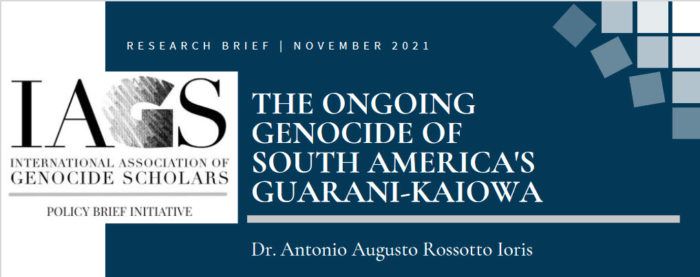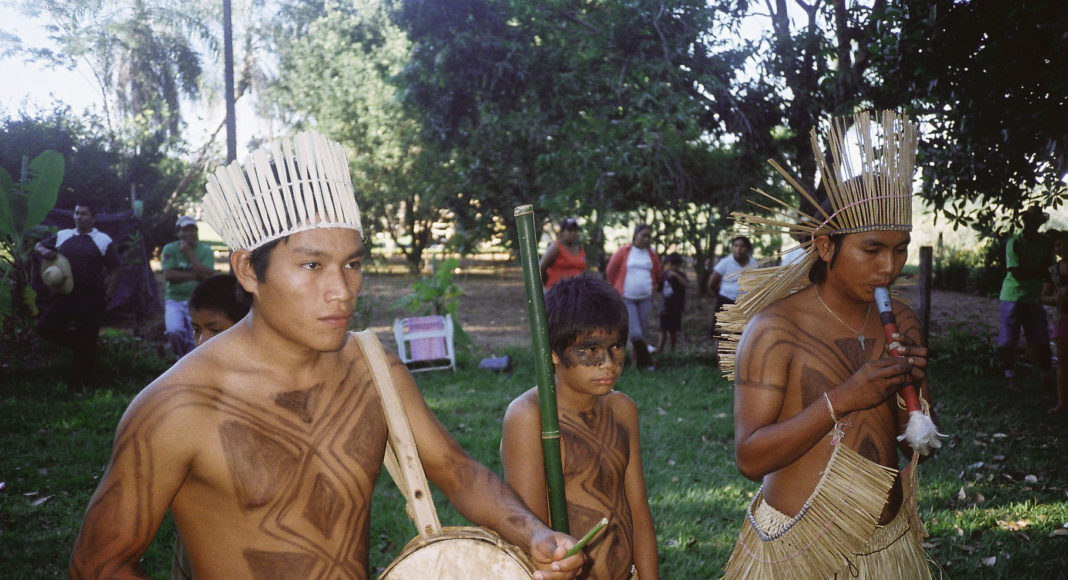This article appeared as an IAGS Research Brief in November 2021. You can see the original here.
Antonio Ioris is author of Kaiowcide – Living Through the Guarani-Kaiowa Genocide, Lexington Books/Rowman & Littlefield, London, 2022
LAB is a partner in Ioris’s project Indigenous Brazil Violated – Challenges and risks faced by indigenous peoples in today’s Brazil. The project’s website can be viewed here.

Overview: Indigenous Genocides Today
The ongoing genocide of the Guarani-Kaiowa indigenous people demonstrates a disconcerting face of export-oriented agribusiness production in the center of South America. Although it often fails to attract the same headlines as terrorism, climate change or religious fundamntalism, indigenous genocide remains a recurrent and devastating problem especially in mining and agribusiness frontiers. The opening of new economic frontiers typically involves a combination of greed, power and intolerance that, depending on the circumstances, can lead to the annihilation of the native population. Important to emphasize that the occurrence of an indigenous genocide, as in relation to frontier-making, is independent of the deliberate intention or explicit purpose to eliminate indigenous communities. Indigenous genocides presume a brutal mechanism of ‘othering’ through arbitrary ethnic and social references that exclude and penalize those considered to be inferior. Consequently, as much as addressing the causes of and responsibilities for indigenous genocides, it is necessary to investigate its genesis and space-time junctures.
An indigenous genocide does not happen in isolation from other historical and geographical trends but are certainly related to the violence employed since the time of conquest. During colonization and early nation-building, most genocides were consisted of a brutal displacement and land grabbing of the indigenous peoples. Today, as in the past, there persists an attack on the indigenous world due to the aggressive privatization of land and resources, the invasion of indigenous areas with uneven levels of legal protection, and the imposition of new socio-economic relations by migrants and business sectors. Nonetheless, indigenous genocides continue to receive secondary attention because of the stronger interest in the more characteristic and well-known cases of genocide involving religious, ethnic or national social groups. It suggests that additional work is required to better understand the causes and the evolution of contemporary indigenous genocides.
The Guarani-Kaiowa Genocide: Kaiowcide
Kaiowcide has become a necessity of mainstream development, whilst the sanctity of regional economic growth and private rural property are excuses invoked to justify and
conceal the genocidal violence.
One of the most emblematic cases of indigenous genocide unfolding in the world today involves the Guarani-Kaiowa people, in the center of South America, on the border between Brazil and Paraguay. This indigenous population, located in the Brazilian State of Mato Grosso do Sul, with around 55,000 people, has been the target of genocidal violence since the 17th century. The Guarani-Kaiowa were severely impacted by disputes between Portugal and Spain, the exploitation of erva-mate (leaves of Ilex paraguariensis used for drinking) and, in the 20th century, the transference of their land to private farmers executed by the Brazilian government according to policies that encouraged the occupation and economic exploration of the western half of the country. Such illegal and unconstitutional consolidation of private farms on indigenous lands has accelerated since the 1960s with the expansion of agribusiness and the production of soybean, sugarcane and cattle rearing. The ancestral land of the Guarani-Kaiowa became an object of great economic interest and a locus of speculation, regardless of the rights and demands of the indigenous communities.
With the re-democratization of Brazil in the late 1970s and the end of the military dictatorship, the Guarani-Kaiowa initiated a creative process of community mobilization, general assemblies (called Aty Guasu) and valorization of their virtuous way of life (Teko Porã in the Guarani language). Extended families more severely affected by land grabbing and dispossession, with the strong support from the rest of the communities, organized campaigns and acts to reclaim their land, what is described as a process of ‘retaking’ (retomada). As expected, the reaction of the agribusiness sector, together with police forces and allied judges, was to brutally repress any form of indigenous
grassroot mobilization.
That was the beginning of the contemporary genocidal phase – designated as Kaiowcide – which has been primarily directed against those who have tried to challenge the tenuous legitimacy of agribusiness-based development. Kaiowcide is not just a case of intense violence or widespread murdering that has tragically resulted in the systematic assassination of numerous political leaders and community members. On the contrary, this indigenous genocide is caused by obscene malnutrition, child mortality, deliberate road accidents, sexual assault of women and girls, the unjustified incarceration of indigenous individuals, lack of water supply and health services, and the sharp escalation of suicides (especially affecting teenagers and young adults). Kaiowcide is something qualitatively different from other serious crimes committed against marginalized, subaltern and non-white communities around the country. This ongoing indigenous genocide is actually the reincarnation of old genocidal practices of agrarian capitalism employed to extend and unify the national territory. Kaiowcide has become a necessity of mainstream development, whilst the sanctity of regional economic growth and private rural property are excuses invoked to justify and conceal the genocidal violence. The phenomenon combines strategies and procedures based on the competition and opposition between groups of people who dispute the same land and the relatively scarce social opportunities of an agribusiness-based economy. Only the focus in recent years may have shifted from assimilation and confinement to abandonment and confrontation, but the intent to destabilize and eliminate the original inhabitants of the land through the asphyxiation of their religion, identity and, ultimately, geography seems to rage unabated.
Conclusion
The genocidal violence against the Guarani-Kaiowa is just the more widespread and visible case of indigenous genocide affecting indigenous peoples in the Brazilian territory. The fundamental cause of Kaiowcide is the illegal and violent appropriation of ancestral areas by non-indigenous people with the support and tacit incentive of public authorities. In particular, the questionable operations of the Brazilian agribusiness sector are a major source of social injustice, environmental degradation, unemployment, and also indigenous genocides, in particular, Kaiowcide. After the election of the openly fascist and pro-indigenous genocide government in 2018 (led by Jair Bolsonaro and his military advisors) the return of the Guarani-Kaiowa to their lands became even more dangerous and uncertain. In recent decades, the Guarani-Kaiowa have been partially assimilated and their social institutions severely undermined so that they could be exploited through depersonalised market-based relations. Their social practices and spatial attachments were repressed to render them invisible from a development perspective and to justify the appropriation of indigenous land and other illegal and racist practices by the state and business sector. At the same time, the Guarani-Kaiowa’s mobilisation and land struggle is their best hope of ethnic resistance and the main force that allows them to continue hoping for a better life under a different world order. The fight for their ancestral land has caused considerable distress and internal tensions, but it has also strengthened the internal ability of the Guarani-
Kaiowa to negotiate, act, and live through Kaiowcide.
Policy Recommendations
- Direct material support and legal assistance to indigenous peoples suffering from genocide, as the Guarani-Kaiowa, are urgently required to face the powerful Brazilian agribusiness sector (so far, the Guarani-Kaiowa have received help mainly from the Indigenist Missionary Council-CIMI and from some activist organizations and public universities).
- The desperate campaigns for survival and social inclusion mobilized by the Guarani-Kaiowa, indigenous representative associations and civil rights organizations must be more proactively endorsed by the international community and foreign governments.
- Brazilian politicians and agribusiness leaders accused of taking part in Kaiowcide need to be immediately brought to justice in international courts (that is, beyond the disruptive influence they exert on local and national tribunals, especially considering that many judges are also landowners and agribusiness farmers).
- Retailers and supermarkets (notably in the Global North) must stop buying agricultural commodities from Brazil (soybean, meat, sugar, etc.), particularly coming from the Amazon and Centre-West regions.
- More collaboration between academics, policymakers and indigenous communities is needed to better conceptualize and understand the causes and the evolution of indigenous genocides beyond limited conceptions of intent and the focus on the direct assassination of the victims.
About the Author
Antonio Augusto Rossotto Ioris is a reader in political geography and director of the MSc programme on environment and development at the School of Geography and Planning, Cardiff University.
Recommended Reading
Ioris, Antonio Augusto Rossotto. Frontier Making in the Amazon: Economic, Political and Socioecological Conversion. Cham, Switzerland: Springer, 2020.
Ioris, Antonio Augusto Rossotto. “Ontological Politics and the Struggle for the Guarani-Kaiowa World.” Space and Polity 24, no. 3 (2020), 382-400.
Ioris, Antonio Augusto Rossotto. Kaiowcide: Living through the Guarani-Kaiowa Genocide. Lanham, Maryland: Lexington Books, 2021.
Simpson, Leanne Betasamosake. As We Have Always Done: Indigenous Freedom through Radical Resistance. Minneapolis: University of Minneapolis Press, 2017.
Talaga, Tanya. All Our Relations: Indigenous Trauma in the Shadow of Colonialism. Melbourne & London: Scribe 2020

